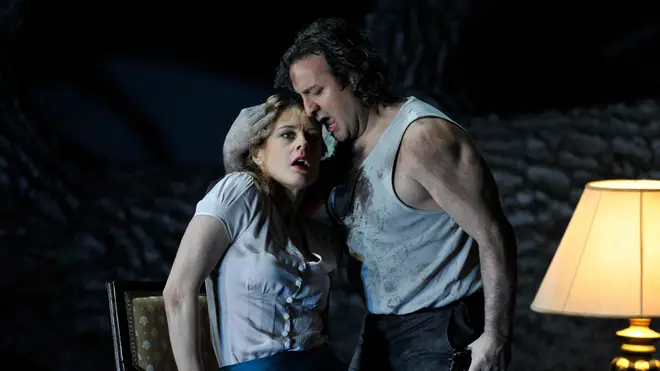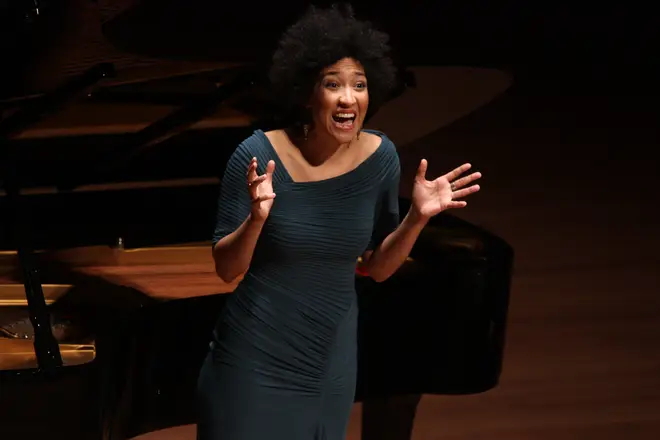Royal Opera House hires ‘intimacy coordinator’ for sex scenes, in historic first for British opera
1 February 2022, 16:52

As the Royal Opera House hires its first ‘intimacy coordinator’, we take a look at the rise of this role within the performing arts sector.
Listen to this article
Ita O’Brien, the ‘intimacy coordinator’ for the Royal Opera House’s new production of Handel’s Theodora, is thought to be the first appointment to such a role in the history of British opera.
An intimacy coordinator’s job is to direct a group of performers who appear and participate in scenes with a sexual nature or other intimate scenes.
This role is commonplace on stage and screen, especially in the wake of the #MeToo movement, which found global recognition in 2016 when allegations against members of the film industry were posted on social media.
Intimacy coordinators are there to ensure actors feel safe, and comfortable in productions where they may feel vulnerable due to the nature of the work they’re performing.
O’Brien worked with the Royal Opera House cast on the Handel opera, ahead of the production’s opening on 31 January 2022.
“Opera...is mostly written from history and mostly by men,” O’Brien told the Guardian in a recent interview. “Power plays are a big part of the [genre’s] narrative. So to help bring female empowerment to Theodora has been really rewarding.”
Originally a ballet dancer, O’Brien has previously referred to her role as akin to that of a stunt coordinator. Her credits as an intimacy coordinator include Netflix’s Sex Education, and the 2020 TV adaptation of Sally Rooney’s Normal People.
“I once called the role ‘intimacy director’,” O’Brien explains in another Guardian article from 2020, “which was completely wrong, I made lots of directors very nervous.
“But just like a stunt coordinator, I’m trying to improve communication, streamline production, serve the director’s vision and bring my skill of choreography and dance to the set.”
O’Brien has been developing practices in regards to intimacy in the performing arts since 2014. She rose to significant prominence three years later when she introduced the ‘Intimacy On Set Guidelines’ to the industry; a set of rules designed to protect performers during scenes that involve sex or nudity.
Soprano Julia Bullock, who stars as Theodora in the new Royal Opera House production, was ‘relieved’ by O’Brien’s involvement in the production.
She told the Guardian, “I’ve been in so many rehearsal spaces where usually it’s the performers who are making complaints about scenes, but to have that preemptively addressed was such a relief.
“In opera, there’s so much attention given to the craftsmanship of the music, the set design, the direction of the singing and choreography, in order to allow human moments to become amplified on stage. But that also means we need to take care of the human beings who are embodying those moments.”
Bullock adds, “One of the first things [O’Brien] talked about was how only those directly involved in an intimate scene should be in the room for its staging. But I remember during my first ever intimate performance, my partner and I were being witnessed by 50 people, and the conductor was asking, ‘Shouldn’t Julia be simulating more noises on stage?’”

Opera is a genre filled with themes including power, manipulation, exploitation, and sadly in some cases, graphic abuse of a variety of natures. While many critics agree it’s important to stay true to a composer's vision, some argue that productions can take these themes too far, resulting in uncomfortable viewing material.
In 2015, the opening night of Rossini’s William Tell at the Royal Opera House was met with boos and heckling from the London audience.
Given a one-star rating by The Stage, reviewer George Hall described the reaction as “the noisiest and most sustained booing I can ever recall during any performance at this address”.
A third act scene graphically depicted the sexual assault of a woman, where the non-singing actress was stripped nude and it was suggested that multiple men molested her. The scene lasted for five minutes, prompting an audience walk-out.
The audience was so appalled by the scene that the director of the opera, Kasper Holten had to issue a statement the next day saying, “The production intends to make [this] an uncomfortable scene, just as there are several upsetting and violent scenes in Rossini’s score.
“We are sorry if some people have found this distressing.”
Just a year later, prior to the opening of the Royal Opera House’s production of Lucia di Lammermoor, the opera company sent a caution to all ticket-holders, warning that the production has moments which would “feature sexual acts portrayed on stage and other scenes that – as you might expect from the story of Lucia – feature violence”.
Curtain call for the first night of Theodora. @ItaOB front and centre as the first Intimacy Coordinator at #royaloperahouse pic.twitter.com/rN8l3ERiuH
— rustlem (@rustlem) January 31, 2022
A 2019 study by the Musicians Union revealed that almost half (48 percent) of musicians have experienced sexual harassment at work, making the introduction of this role a necessary step forward for the industry.
There has been an uptake for intimacy coordinators across multiple areas within the performing sector, with Atlanta Opera House – who hired an intimacy director in 2019 – leading the way in the world of opera.
However, O’Brien warns that occasionally she found this to be more of a “tick-box exercise”.
“I’ve worked for producers who don’t actually want me there,” says O’Brien. “[And they] say to me, ‘Come in, get our nudity waivers ready and then stand back and do nothing’.
“I’m still encountering this and it feels like I’m on the frontline of a war.”
But while O’Brien’s appointment may be the first for the genre in Britain, it will not be the last.
In light of her appointment, Oliver Mears, director of opera at the Royal Opera House, said that the company was committed to make sure intimacy coordination was part of future productions, and stressed the safety of their artists, creatives and staff as the utmost priority.






















